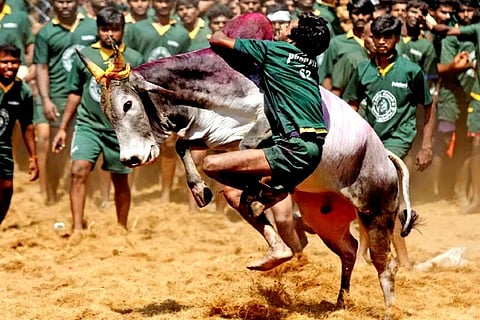

Chennai
There seems to be a disconnect between the Tamil Nadu government’s perception of threat from the coronavirus, and the response mechanism employed to control the surge. Pongal restrictions prohibit members of the public from entering all places of worship between January 14 and January 18. To add to this, there will be a complete lockdown on Sunday during which only essential services will be allowed to operate. But despite the surge in COVID cases, the government has approved the conducting of Jallikattu, Manjuvirattu, and Vadamadu.
The annual bull running event is a mainstay of the hamlets in Madurai district such as Alanganallur, Palamedu and Avaniyapuram. Of course, the conduct of these events comes with guidelines, which include 50% cap on occupancy at the venues and ensuring that only 150 spectators are allowed, so as to comply with distancing protocols. The spectators are being asked to produce proof of two vaccinations as well as a COVID-negative certificate. Similar restrictions have been placed on the master and trainer of the bull as well as capping the number of bull tamers at 300. The district administration in Vellore, Tiruvannamalai, Ranipet and Tirupattur have put their foot down and prohibited the conduct of Jallikattu events, keeping in mind the spike in infections.
As many as 20,911 people tested positive for COVID-19 on Thursday as the Pongal week kicked into top gear, with an overall positivity rate crossing the 20% mark in Chennai, Chengalpattu and Ranipet. In Chennai, the daily caseload was 8,218 fresh cases. It might be argued that the real fervour of Jallikattu is usually witnessed only in the rural and agricultural hinterlands of the State, where the cases are still hovering around a manageable level. But it is important to remember that the lower incidence of testing, as well as hesitancy regarding vaccination, are also more prevalent in such regions, which could potentially open up a Pandora’s Box in the light of relaxations made on account of Jallikattu.
There are aspects of Jallikattu that have escaped the radar of TN’s authorities. Even last year, members of Jallikattu teams had expressed their concerns that at least four to five individuals are needed to take care of each bull, and that the two-member mandate is a risky affair. Similarly, limiting the number of tamers to 300 is a recipe for disaster as it prioritises tamers on a first come first serve basis as opposed to selecting tamers based on their prior experience in bull running. One may also recall that last year, in Avaniyapuram, police had to resort to lathi charge as around 2,500 bull tamers had gathered to register for the event, when only 500 tokens were to be distributed. And as far as the tamers in high-octane sports such as Jallikattu are concerned, the idea of masking and sanitising goes right out the window in the heat of the moment.
One also needs to consider the problem of the elephant in the room, or in this case, the bull in the Vadivasal. Venues such as Alanganallur, usually accommodate about 70,000 spectators, who come from various parts of TN to attend this Pongal extravaganza. It might be a gargantuan task for law enforcement officials to ensure that attendance is in strict compliance with COVID mandates. Whether they manage to check each and every spectator for both vaccination and COVID-negative certificates, remains to be seen.
Jallikattu, by nature, is a sensitive subject, and a phenomenon that is close to the hearts of Tamilians, something for which they have not hesitated to stage protests or approach the Supreme Court as well. However, at a time like this, it would not have hurt to exercise a modicum of discretion in conducting such contact-heavy events, which have all the potential to turn into super spreader clusters of infection.
Visit news.dtnext.in to explore our interactive epaper!
Download the DT Next app for more exciting features!
Click here for iOS
Click here for Android